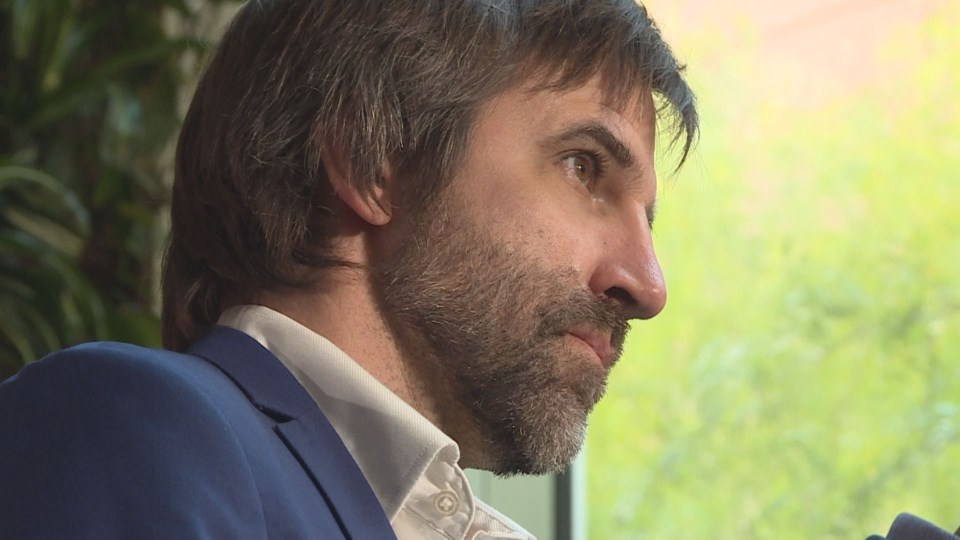BANFF – With a colourful past of arrests and civil disobedience in a bid to bring attention to key environmental issues, Steven Guilbeault is the new federal minister responsible for Parks Canada and Banff National Park.
Prime Minister Justin Trudeau appointed Quebec’s Guilbeault as federal minister of environment and climate change as part of his cabinet shakeup last week ahead of parliament’s return on Nov. 22.
A prominent advocate in the fight against the climate crisis, his ministerial appointment has come under attack by several right-wing Alberta MLAs; however, Banff’s newly elected mayor, Corrie DiManno, is keen to work with Guilbeault.
“We know he has a history of environmental activism and personally I can think of no better place for this elected MP to focus his energy than the ministry of environment and climate change,” she said.
First elected in 2019 as MP for Laurier-Sainte-Marie, Guilbeault’s commitment to environmental issues started when he was just five years old, when he climbed a tree to protect it from real estate developers who were about to cut down the woods behind his home in La Tuque.
Twenty-five years later, he scaled the CN Tower in Toronto in 2001 to protest Canada’s lack of action on climate change, calling for ratification of the 1997 Kyoto agreement to cut greenhouse-gas emissions.
In 1993, Guilbeault co-founded Équiterre, the largest environmental organization in Quebec, and served as its senior director from 2008 to 2018. He also worked as a director and campaign manager for Greenpeace.
For more than 10 years, he was a strategic advisor at Cycle Capital Management, a Canadian fund dedicated to the development of clean technologies and worked for Deloitte & Touche as well as Copticom, a firm specializing in the green and social economy, and transportation.
His antics drew media attention in 2002 in Alberta as one of the organizers behind a crew of Greenpeace activists climbing the home in Lakeview of then-Premier Ralph Klein to place solar panels on the roof.
“As an activist and strategic advisor for dozens of governments and businesses in Canada and abroad, Minister Guilbeault is a pragmatist who works to make a difference by building bridges and relationships,” according to the prime minister’s website.
Mayor DiManno said the new minister, as a long-time environmental champion, will find a partner in Banff.
She said they have shared goals to cut greenhouse gas emissions, move to zero waste going to landfills and to protect this vital part of Canada – Banff National Park and UNESCO World Heritage Site.
“The Town of Banff strives to be a model environmental community and we work to demonstrate leadership in climate action,” she said.
“We believe it is important for Parks Canada to also demonstrate leadership on environmental protection and addressing climate change.”
The Town of Banff was critical of Parks Canada’s draft management plan for Banff National Park, saying more could be done to effectively respond to local and regional climate-related impacts and contribute to federal targets for reducing greenhouse gas emissions.
In the Town’s opinion, most Canadians expect a government agency like Parks Canada to be climate change mitigation leaders, especially considering the significant greenhouse gas emissions generated by international tourism.
“The draft plan falls far short in addressing this expectation,” states the letter which had input from council and administration. “More holistic actions are required to promote and incorporate sustainability into the management, operation, and visitation of the park.”
The Town called on Parks Canada for strategies, tactics, and incentives that support the use of flexible public transportation modes like electric or hydrogen buses, or shuttles, from outlying communities in Calgary and the surrounding region – the source of most vehicle traffic.
The municipality also wants to see disincentives for private vehicle use in Banff National Park such as paid parking, separate and/or additional park entry fees for vehicles, limiting capacity, and pre-departure reservations.
According to the letter, Parks Canada was called upon to invest in local renewable energy, including solar, biomass, heat pumps, geo-exchange/geothermal, waste-to-energy, among some ideas.
Despite excluding the GHG emissions associated with international travel, the most recent Town of Banff greenhouse gas inventory reveals that the community has among the highest emissions intensity of any municipality across the country on a per capita basis.
“This is a direct result of the very high energy consumption associated with visitor services, accommodation, transportation, and infrastructure required to host millions of visitors annually,” the letter reads.
“Parks Canada and the Town of Banff share a direct responsibility to work toward reducing these emissions, and yet the draft plan does not appear to acknowledge the severity of this issue or present sufficient strategies or tactics for addressing it.”
Meanwhile, in Trudeau’s cabinet shuffle, a new minister responsible for tourism was also appointed last week.
Representing Edmonton Centre, Randy Boissonnault, who was first elected in 2015 and re-elected in 2021, is now the minister of tourism and associate minister of finance. He’s a successful entrepreneur, community leader and philanthropist.
Officials with Banff and Lake Louise Hospitality Association (BLLHA) say they are pleased the government recognized the significance of Canada’s tourism industry by appointing a minister responsible for this sector, which employed one out of every 11 Canadians before the COVID-19 pandemic.
“We are hopeful that with Minister Boissonnault being from Alberta and also holding ministerial responsibility as deputy minister of finance that the government’s future responsiveness to this industry and the challenges we face on recovery will be even stronger,” said Darren Reeder, BLLHA's executive director.
Boissonnault served as parliamentary secretary to the minister of Canadian heritage from 2015 to 2017, championing Canadian arts and culture.
In 2016, Boissonnault became Canada’s special advisor to the prime minister on LGBTQ2 issues, working with organizations to promote equality for the LGBTQ2 community, protect their rights, and address discrimination against them.




